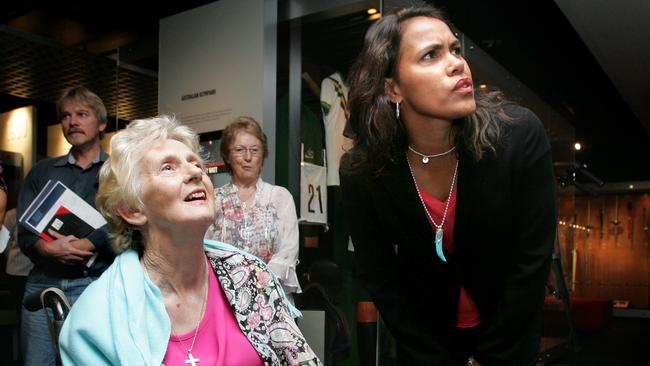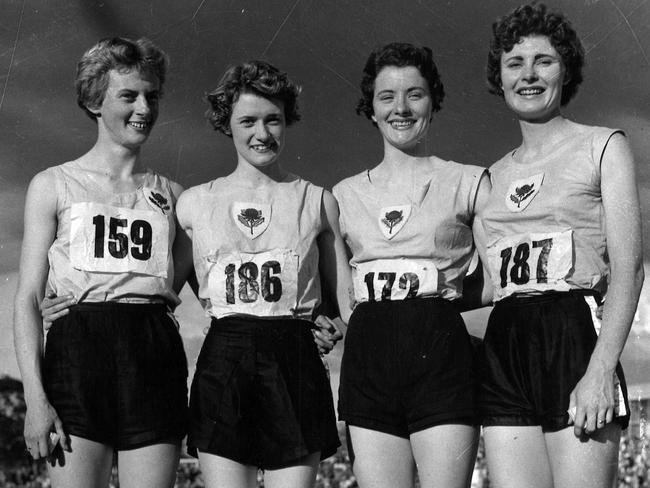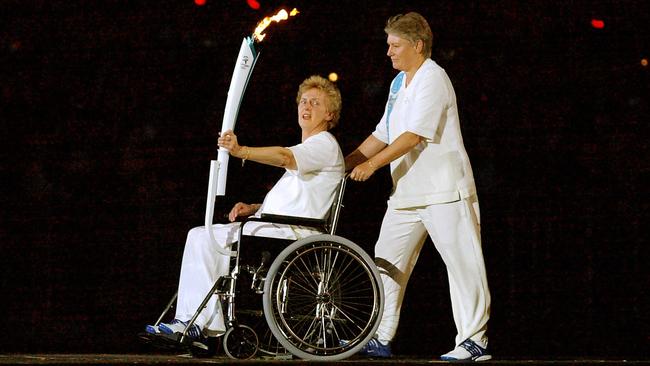Tributes flow for Olympian Betty Cuthbert
Tributes are flowing for Australian sprinting legend Betty Cuthbert who died overnight after a long battle with multiple sclerosis.

Tributes are flowing for Australian sprinting legend Betty Cuthbert who died overnight after a long battle with multiple sclerosis, aged 79.
Olympic gold medallist Cathy Freeman thanked Cuthbert for “the inspirational memories’’.
“It’s a very sad day, there’s no doubt about it,” Freeman said. “Betty is an inspiration and her story will continue to inspire Australian athletes for generations to come.
“I’m so happy I got to meet such a tremendous and gracious role model, and Olympic Champion.”
Thank you for the inspirational memories, Betty Cuthbert. Rest in peace.
— Cathy Freeman (@CathyFreeman) August 6, 2017
Cuthbert was a dear friend of tennis great Margaret Court who this morning remembered the sprinter as a devout Christian who loved life and loved running for Australia. Court said Cuthbert was also “just a very nice person”. “One of the heroes of our nation,” Court told The Australian.
The Australian Olympic Committee acknowledged Cuthbert as one of the nation’s greatest ever Olympic athletes. In a media statement, the Australian Olympic Committee extended its condolences to the Cuthbert family, her friends, her carer Rhonda Gillam “and a nation that idolised the track great”.
AOC President John Coates said: “Betty was the Golden Girl of the track and a national heroine. It’s very sad to lose such a great champion.”
“Betty battled her illness for many years and showed tremendous courage, but more importantly she always managed to smile,” Coates said.
Rest in peace Betty Cuthbert, forever a golden girl.
— Bill Shorten (@billshortenmp) August 6, 2017
The AOC wrote that she burst onto the scene at the 1956 Olympic Games as a little-known 18-year-old whose uncertainty around making the Games prompted her to buy tickets to attend as a spectator just in case she missed the Australian Team.
“History would show that instead of watching the world’s best from the stands, she became the world’s best on the track,” the AOC wrote.
Australian Olympic historian Harry Gordon wrote about her amazing games with these words; “The heroine of the main stadium, the athlete who became known as Australia’s Golden Girl, was a tearaway sprinter called Betty Cuthbert, then aged 18. She had straw-coloured hair and a distinctive, wide mouthed manner of gulping air that made her look to be roaring exultantly as she streaked down the track.”
VALE Betty Cuthbert. The Australian Olympic Family is saddened to hear the news that 4x Olympic Champion Betty Cuthbert has passed away. pic.twitter.com/F3tXadqNPD
— AUS Olympic Team (@AUSOlympicTeam) August 6, 2017
Having set a new Olympic record in the heats of 11.4 seconds, she claimed gold in the 100m before also taking out the 200m event.
Cuthbert then combined with Shirley de la Hunty, Norma Fleming (Croker) and Fleur Wenham (Mellor) to win the 4x100m relay while setting a new world record. The result ensured Cuthbert became the first Australian to win three gold medals at the same Olympic Games.
“On the track in 1956 in Melbourne she joined a special band of athletes who started what we call the “golden era” in Australian sport, Betty was a member of a unique band of athletes who inspired thousands of Australians,” Coates said.
When njury cruelled her attempts to defend her titles at the 1960 Rome Olympic Games, Cuthbert retired but that did not last. She was named co-captain of the Australian track team for the 1964 Tokyo Olympic Games.

It was there, she claimed her fourth and final Olympic gold medal after running a flawless 400m final.
“She came back after 18 months (after retiring) to tackle an event that had newly achieved Olympic recognition, the 400 metres, and at her last showdown in Tokyo she showed tremendous toughness to beat runners who were thought to be her superiors,” said Gordon.
“She always regarded that single gold medal of 1964 as a far greater triumph than any of her three in 1956.”
Marlene Mathews finished in third behind Cuthbert in both the 100m and 200m events in 1956 and remembers her fondly.
“I have never met anyone that had such great faith and determination. It was this faith that kept her going for so long and through the most difficult times.
“I once as asked Betty how she would like to be remembered and she said ‘I never want to be forgotten.’ Her triumphs on the athletic track will make sure she will always be remembered as the ‘Golden Girl’ of 1956 and the wonderful comeback to win the 400m in Tokyo in 1964.”
Prior to the end of the century the only Australians to match Cuthbert’s tally of four Olympic gold medals were swimmers Dawn Fraser and Murray Rose. In 2004 swimmer Ian Thorpe became the only Australian to now have more gold medals than Cuthbert with five.
The AOC described one of the most touching moments of the Opening Ceremony of the Sydney 2000 Games was a wheelchair-bound Cuthbert being pushed around the Olympic track by friend Raelene Boyle while carrying the Olympic Torch.
“We were so pleased that she could participate in the Opening Ceremony of the Sydney 2000 Games which was so special to her given the proximity of the Olympic Stadium to her family home in Ermington,” Coates said.
“Following her diagnosis of MS, she dedicated much of her life to fundraising to help find a cure,” continued Coates.
“She was also a great supporter of fundraising efforts for Australia’s Olympic Teams having made herself available for every event in Western Australia up until 2012.”

The Sport Australia Hall of Fame, of which Cuthbert is a member, also offered their condolences. “Betty was a true inspiration and role model to all Australians,” chairman John Bertrand said. “Her feats on the track brought together Australians as one. She loved the country and we loved her”
Her death, south of Perth overnight, was announced on Twitter this morning by Athletics Australia. “Athletics Australia is saddened to confirm the passing of Olympic legend Betty Cuthbert, Our thoughts with her family & friends,” the organisation posted.
Athletics Australia is saddened to confirm the passing of Olympic legend Betty Cuthbert, Our thoughts with her family & friends. #RIP pic.twitter.com/l4onq19Yke
— Athletics Australia (@AthsAust) August 6, 2017
Cuthbert was diagnosed with multiple sclerosis in 1974. The neurological disease strips nerve coatings, diminishing a person’s ability to control movement.
Cuthbert was Australia’s first inductee into the IAAF Hall of Fame in the inaugural year in 2012, along with Jesse Owens, Carl Lewis and others.
Her lunge at the line in the 100m at the Melbourne Olympics is captured in bronze outside the Melbourne Cricket Ground, scene of her 1956 track and field glory.
She failed to defend the titles at the 1960 Games in Rome due to injury. But she returned to the Olympics four years later after a two-year break from the sport, winning a fourth gold medal and becoming the first athlete in the world to do so in four different events.
Cuthbert was born in Sydney in 1938, a twin to sister Marie.
BETTY CUTHBERT’S TRACK AND FIELD CAREER
OLYMPICS: GOLD - 1956 Melbourne Olympics 100m GOLD - 1956 Melbourne Olympics 200m (world record) GOLD - 1956 Melbourne Olympics 4x100m (world record) GOLD - 1964 Tokyo Olympics 400m
HONOURS: INDUCTEE - IAAF Hall of Fame (2012) INDUCTEE - Athletics Australia Hall of Fame (2000) INDUCTEE - Sport Australia Hall of Fame (1985)






To join the conversation, please log in. Don't have an account? Register
Join the conversation, you are commenting as Logout